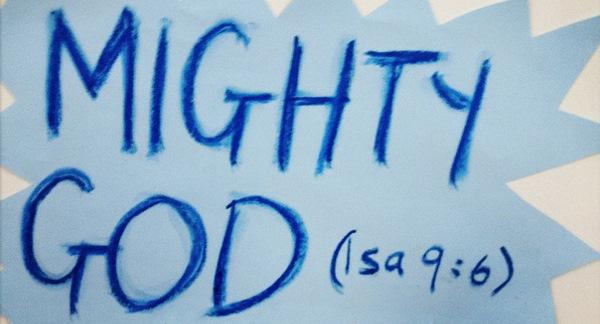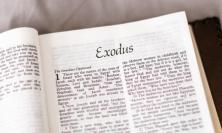The second title that Isaiah gives to the child that ‘has been born for us’ – ‘Mighty God’ – brings into sharp focus the differences between the ways in which two communities have been reading the Bible for centuries, says David Neuhaus SJ. But whomever Isaiah was referring to, what is important is that this verse reveals to every one of its readers or hearers something about the God that they know through faith.
Read 'A child by any other name': the introduction to our Advent series. Read >>
For a child has been born for us, a son given to us; authority rests upon his shoulders; and he is named Wonderful Counsellor, Mighty God, Everlasting Father, Prince of Peace.
Isaiah 9:6 is a favourite Christmas verse. Christians know exactly whom Isaiah is referring to, especially as they prepare to celebrate Christmas. However, it is important to point out that two groups of readers of the Isaiah text challenge this seemingly clear-cut Christian understanding. Our Jewish brothers and sisters read the same text but do not see there any reference to Jesus. Furthermore, academic exegetes, scientific interpreters of the Bible, ask whether it is coherent and sensible to claim that the author of this verse, writing in the second half of the 8th century BC, was indeed referring to Jesus of Nazareth. Moreover, is it probable that Isaiah referred to a small child, who was born in his time, as ‘mighty God’?
Of course, any answer to this question has to confront the issue of identifying the child in the Isaiah text, who according to the verse has already been born in the time of Isaiah. Some Christians might still insist that it is Jesus of Nazareth. After all, they might argue, Isaiah is a prophet so he knows what will be. However, a prophet is not a fairytale fortune-teller who predicts the future clearly, but rather a person sent by God to bring a message of warning or of consolation to the people of his or her time – a specific people at a specific time. The child in Isaiah 9:6 ‘has been born for us’ and Isaiah is surely referring to an identifiable child as he writes for the residents of Jerusalem and the Kingdom of Judah in the time of King Ahaz, a time of great tribulation for the Kingdoms of Israel and Judah. As Christian readers of the Bible, we are called to realise that the simplistic understanding of Old Testament prophecy as directly speaking about Jesus is only one valid reading of the text, and is problematic on many different levels.
Isaiah is sent to his people in the 8th century BC, when king and people are seized with anxiety, looking around at a frighteningly threatening world. It would be simply sadistic for God to wink at them and say: ‘What are you worried about? Hang on for 700 years and I will send Jesus!’ So what is Isaiah referring to when he transmits the message about a child who has been born and seems to be named ‘mighty God’? He is surely pointing to something within the world of his listeners that will bring them comfort and reveal who God is. This child, like the one born of the young woman in Isaiah 7:14, proclaims that God is with us in our trouble and that God will be ultimately victorious.
Many Jewish and academic exegetes have suggested that the child in question is the heir to the throne in Isaiah’s day: Hezekiah, son of Ahaz, who will be remembered as one of the few kings who ‘did what was right in the sight of the Lord just as his ancestor David had done’ (2 Kings 18:3). Of course, it is then striking and clearly unusual to call a human child ‘mighty God’! The great Jewish medieval commentator, Rabbi Solomon son of Isaac, known as Rashi (1040-1105), put forward the claim that in fact the three divine titles – ‘Wonderful Counsellor, Mighty God, Everlasting Father’ – refer not to the child but to the one naming the child. ‘For a child has been born for us, a son given to us; authority rests upon his shoulders; and Wonderful Counsellor, Mighty God, Everlasting Father names him [calls his name] Prince of Peace’. Other exegetes have argued that in the Hebrew construction the word translated as ‘God’ might instead be the descriptor of the word translated as ‘mighty’. They argue that a reasonable translation of the expression might be ‘great hero’ – the Hebrew word El (translated ‘God’) might refer to being Godlike in grandeur, and the Hebrew word gibor (translated ‘mighty’) might refer to the substantive ‘strongman’ or ‘hero’. This would then fit into the string of descriptions: Wonderful Counsellor, Great Strongman, Everlasting Father, Prince of Peace.
The difficulty with the term ‘mighty God’ is borne out when we look at the ancient Greek translation of the Isaiah text. It would seem that the rather clumsy translation seeks to expunge the problematic possibility of divine identification of a human child in the Hebrew text. The Greek does not have the word El (theos in Greek) but rather the word angelos – ‘a messenger’. Translations of the Greek text tend to affiliate the word ‘messenger’ with the preceding ‘wonderful counsellor’ – messenger of great counsel. The Greek text might indeed preserve an ancient understanding of the Hebrew.
Does this then mean that the modern translation of our Old Testament should be ‘corrected’? Centuries of Christians have understood this text, and many others in the Book of Isaiah, to refer to Jesus Christ. I would be reluctant to give up on the possibility that the text calls a small child ‘mighty God’, even though I need to admit that what I understand might not have been exactly what the original author meant. In fact, perhaps what he meant in this particular case is indeed closer to what my Jewish brothers and sisters understand when they read the same verse. However, what I see in the text is what I recognise as the culmination of God’s plan in the birth of a child, given to us, who is indeed ‘mighty God’, a birth that took place hundreds of years after that other child was born.
Through the centuries, two communities have been reading the Bible alongside one another. These readings have not peacefully coexisted but challenged one another, and in too many cases this has meant that we read the Bible against one another. Nowhere is this more evident than in the Old Testament texts in which Christians see Christ. In fact, an essential part of the greatness of the Fathers of the Church was their Christological reading of the Old Testament, making it everywhere relevant for the Church that seeks Christ. Wherever they looked they saw Christ. Today, do we judge this perspective to be wrong because it does not conform to what exegetes tell us might have been the original authors’ intention? Is it wrong because Jewish readers do not see what Christian readers see?
The new relationship with the Jewish people, which we celebrate this year in the 50th anniversary of the Second Vatican Council and of the publication of Nostra aetate, obliges us to broaden our understanding of the Biblical texts we take for granted. Traditionally, Christians had assumed that Jews were blind in their reading of the Old Testament because they did not perceive the figure of Christ, who Christians claimed was prefigured and promised in these ancient Scriptures. The basis for this accusation can be found in Paul’s writings: ‘their minds were hardened. Indeed, to this very day, when they hear the reading of the old covenant, that same veil is still there, since only in Christ is it set aside’ (2 Corinthians 3:14). This had been an important pillar in the ‘teaching of contempt’ that characterised too much of Christian discourse about Jews and Judaism.
However, today, Christians are encouraged to respect the Jewish reading of the Scriptures that are also theirs. They are also encouraged to take seriously the fruits of academic research. Christians now admit that they see Christ in the Old Testament not because he is objectively there but because he becomes perceptible to the Christian who reads the Old Testament text in the light of the New. As the 2001 document of the Pontifical Biblical Commission explained:
Although the Christian reader is aware that the internal dynamism of the Old Testament finds its goal in Jesus, this is a retrospective perception whose point of departure is not in the text as such, but in the events of the New Testament proclaimed by the apostolic preaching. It cannot be said, therefore, that Jews do not see what has been proclaimed in the text, but that the Christian, in the light of Christ and in the Spirit, discovers in the text an additional meaning that was hidden there. (The Jewish People and their Sacred Scriptures in the Christian Bible (2001), §21)
The Jewish reading of the Scriptures, according to the teaching of this revolution, is not an expression of blindness but rather an authentic understanding of these Scriptures:
Christians can and ought to admit that the Jewish reading of the Bible is a possible one, in continuity with the Jewish Sacred Scriptures from the Second Temple period, a reading analogous to the Christian reading which developed in parallel fashion. Both readings are bound up with the vision of their respective faiths, of which the readings are the result and expression. Consequently, both are irreducible (The Jewish People and their Sacred Scriptures in the Christian Bible (2001), §22)
An integral part of the revolution in Jewish-Christian relations is the realisation that Jews and Christians share a language and a spiritual heritage that is based on the Scriptures they share – called the Old Testament by Christians, the TaNaKh by Jews. However, one of the important ways the Christian reading of the Old Testament differs from the Jewish one is in the identification of the Messiah, omnipresent in the Christian reading and only discretely hinted at in the Jewish one. Faith in Jesus distinguishes the Christian reading of the Bible from the Jewish one.
It should be quite obvious that Isaiah lived long before any debate between Jews and Christians. In fact, by applying historical and critical methods to the text, it becomes a little clearer to one and all who the prophet is and in what context he is writing. Undoubtedly, the verse referred to a child who was in that context, a child who would also be ‘God with us’ in a situation where God seemed so distant. However, the fact that this text became Holy Scripture for Jews and for Christians means that millennia of readers have found new and additional meaning in it. Whatever the precise historical reference, the text teaches us to speak about God, a God we know through faith. It is this faith that forms our understanding not of what Isaiah might have meant back then, but what his words meant to those who wrote the story of Jesus and what they mean to us as Christians right now.
From the perspective of our Christian faith, we know that the same God who speaks through Isaiah then sends His Son, God incarnate, Mighty God. This is not objectively in the text of Isaiah but rather is understood by those who read Isaiah in the light of the life of Christ. Our Jewish brothers and sisters read the same text but do not see what we see, yet what they see might illuminate aspects of what the text has to say that we cannot see because we focus so exclusively on Jesus.
In a newly published document to mark the 50th anniversary of Nostra aetate’s paragraph 4, the Holy See’s Commission for Religious Relations with the Jews explains:
After centuries of opposing positions it has been the duty of Jewish-Catholic dialogue to bring these two new ways of reading the Biblical writings into dialogue with one another in order to perceive the ‘rich complementarity’ where it exists and ‘to help one another to mine the riches of God’s word’ (Evangelii gaudium, §249). (A reflection on theological questions pertaining to Catholic-Jewish relations, §31)
This Christmas, let us again be challenged rather than threatened by the difference in understanding of the words ‘mighty God’ so that we deepen relationship rather than sever it, and grow together in bringing light to this world rather than contributing to darkness. The ‘mighty God’ we seek surely expects nothing less!
Fr David M. Neuhaus SJ serves as Latin Patriarchal Vicar within the Latin Patriarchate of Jerusalem. He is responsible for Hebrew-speaking Catholics in Israel as well as the Catholic migrant populations. He teaches Holy Scripture at the Latin Patriarchate Seminary and at the Salesian Theological Institute in Jerusalem and also lectures at Yad Ben Zvi.






